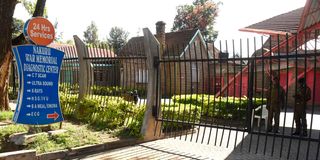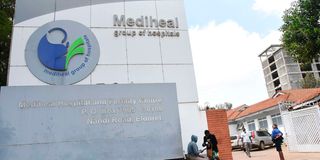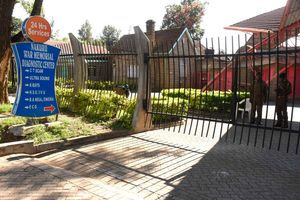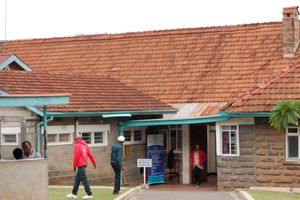
Out patients wait for attendance at the Nakuru Level Five Hospital on June 12, 2017.
For over 100 years, the Nakuru War Memorial Hospital that sits on a 25-acre plot has served residents of Nakuru as an alternative to the Nakuru Level Five Hospital.
Established in 1921 in honour of those who died during World War I, the hospital has over the years come to the rescue of many patients. Several prominent Kenyans have been born and, from time to time, treated at this facility.
Accident victims on the Nairobi-Nakuru-Eldoret highway get treated at the facility before being referred to Nakuru Level Five Hospital, Kenyatta National Hospital and the Moi Teaching and Referral Hospital for specialised care.
However, the hospital's closure due to ownership wrangles between Nakuru County and its management has left the Nakuru Level Five Hospital reeling from the burden of increasing numbers of patients.

The entrance to the War Memorial Hospital in Nakuru on October 28, 2023.
Mediheal Hospital, situated kilometres away near the Free Area on the Nakuru-Nairobi highway, has also been closed down.
The private hospital, owned by former Kesses Member of Parliament Swarup Mishra under the Mediheal Group of Hospitals, was closed down over financial woes.
A few months ago, the troubled Mediheal Hospital sank into a deeper crisis after an auctioneer seized property to recover Sh40 million debt owed to 18 doctors in unpaid salaries. Tango Auctioneers seized property, including 10 vehicles, to recover the debt.
The fate of the two hospitals now remains in limbo.

The entrance to Mediheal Hospital and Fertility Centre in Eldoret town, Uasin Gishu County.
Meanwhile, the Nakuru Level Five Hospital, which serves more than five other neighbouring counties, is now grappling with a rising number of patients.
A nurse at the hospital who sought anonymity said the number of patients had increased substantially since the closure of the two hospitals.
“In some cases, we are forced to discharge some patients to give room for others,” the nurse said.
Recent accounts also reveal harrowing experiences. Last week, Elizabeth Wairimu and Phyllis Juma, who had been admitted to the maternity wing, died in controversial circumstances.
Their families have alleged medical negligence. Elizabeth died as she waited to be transferred to the intensive care unit (ICU). Although county officials have in the past denied the largest hospital in the South Rift is overwhelmed, recent events have prompted them to admit the workforce is strained.
“The Margaret Kenyatta Mother and Baby maternity wing is overwhelmed. Considering the number of deliveries happening here compared to the number of nurses we have, it is severely understaffed,” said Ms Roslyn Mungai, the county Health executive.
The Nation has established that due to the rising number of patients, the facility, which also hosts a cancer centre, is grappling with an acute shortage of nurses, doctors and other medics, as well as essential equipment.
According to Dr Stephen Omondi, the South Rift Secretary of the Kenya Medical Practitioners and Dentists Union, the hospital is short of at least 23 medical officers.
“In the paediatric ward, which should have 12 medical officers, the Margaret Kenyatta Mother and Baby Maternity Unit is left with only six.
“Generally, the hospital needs at least 300 additional nurses. The strained workforce has contributed to the rising complaints of negligence from patients.”
The Nation established the hospital has six ICU beds, with only four equipped with ventilators. It lacks an ICU for children.
In a recent interview, the hospital’s nursing officer-in-charge, Alpharxard Kemboi, denied that the facility has been overwhelmed.
“The average number of patients remains the same. We have been handling between 1,500 and 1,800 patients daily, so the closure of the facilities hasn't affected us much,” he said.
He explained that the impact of the closures has been minimal given that Nakuru War Memorial primarily served patients with “private insurance”. Mr Kemboi also noted that the situation is similar for Mediheal Hospital clients.
“Mediheal Hospital used to handle KDF [soldiers] from Lanet, but they now have their own hospital,” he said.
The two facilities have over the years helped decongest the Nakuru Level Five Hospital, which official records from the Health department show has an 800 bed-capacity and serves more than 2,000 people daily.
The hospital treats referral cases from Samburu, Laikipia, Baringo, Kericho, Nyandarua and some parts of Bomet and Narok counties.
It also serves as a referral facility for a population of more than 2.2 million people against the recommended one million. Locals expressed concerns about the closure of the hospitals. They want authorities to intervene.
“The closure of Nakuru War Memorial Hospital has exposed motorists on the Eldoret-Nakuru-Nairobi highway, including prominent people, senior civil servants and politicians passing through Nakuru, to imminent death. This is the facility that has been serving accident victims along the busy highway,” said Mr James Kariuki, a resident.
Another resident, Mr James Maina, says the hospital is one of the best-equipped in Nakuru.
“Other hospitals have over the years frequently referred their patients to the facility for specialised treatment. Without it, many people are undoubtedly suffering. In 2015, for instance, a baby with complications after birth was transferred there, and despite the parents’ inability to clear the hospital bill, the baby received the best care,” he said.
“The closure of these two major hospitals because of politics is a significant blow. Politicians should not interfere in healthcare operations, especially since they often seek medical treatment abroad rather than locally.”
The two facilities have also played a key role during times of crises and tragedies.
“They helped patients during the Covid-19 crisis in 2020 and 2021, and the 2018 Solai dam tragedy," said Veronica Mwambia, a resident of Milimani.







